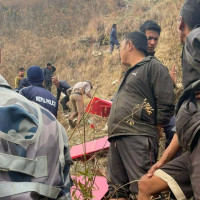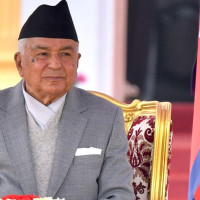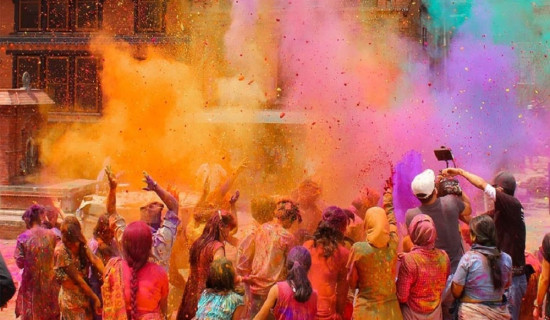- Tuesday, 3 March 2026
Civic Life Key To Fostering Stable Polity
At the elemental level, civic sense often evokes a curiosity about what the people and leadership have contributed to their community, society and the nation. The link of civic wisdom to the entire nation-state demands the empathy of each Nepali living in different geographical locations of the state for each other, cultivating a sense of solidarity in the national community and accepting the sanity of its tradition, normative and constitutional standards and conferring loyalty to them. It is not the rational side of human faculties but their feelings, emotions and morality that bring them the sentiments of national unity and sociability. The civic life of Nepalis is linked to their constant awareness of national memories and history and involvement in the general affairs of society and the state in the pursuit of promoting public goods.
It is important to construct citizenship out of their varied private life and enable them to exercise their rights and duties in accordance with the ethical standards of politics and the constitution. One essential aspect of Nepali politics is the beginning of public deliberation on the complex challenges faced by the people and nation. Intellectuals suggest measures to solve them. Deliberation on issues and crafting of appropriate policies is not only about mutually learning but also finding suitable means to address the underlying causes of problems. Reasoned deliberation helps each participant to keep self-control and evade the wild manifestation of instinct that drains cognitive power and judgmental ability.
Public education
Enthused by the virtues of satto guna, duty-bound Nepali civil society has cultivated the spirit of public education, community health and expanded the domain of public space. They have cultivated a sense of duty, discipline and loyalty to the state and catalysed timely social reforms for positive change so that each generation of Nepalis can live peacefully in the shared national space. They upheld the deep yearning of dana, giving to the helpless, struggling for survival and opportunity and making a difference in their lives. It makes their lives noticeably resilient and rewarding. An attentive public has been consistently expressing its views on the digital platform and writing letters to the editors in print media about the state of the nation. Commentaries on radio and television add another dimension to people’s civic concern.
The other is engagement in reforming the irrationality of society rooted in archaic customs, traditions and prejudices that do not recognise the social equality and competence of people to think, pass judgments and act in public interests. It has helped to reconcile with society’s needs. Nepali sages since ancient times have sought to delink power from its muscular stuff, organised discourse in the public sphere and induced continuous reform of laws, policies and institutional values. A robust civic life in Nepal requires active citizenship. Active citizenship is the function of civic education whereby people and their representatives undertake responsibilities for societal progress.
It is essential to marshal their hearts, minds and souls to the task of nation building, affirming the diversity and integrity of each culture that has fostered the heritage of tolerance to diverse people and peaceful coexistence. In a multi-cultural society like Nepal, social and national ideals enrich civic values that hold the society and political structure of the nation together and civic virtues that make up good citizens able to contribute to the society’s stability, progress and endurance. This presupposes that Nepali leadership possesses moral traits that the nation has shaped for the satisfaction of spiritual and material interests so that they do not lose the basic compassion and power to mobilise people for the cultivation of public and national interests.
The spirit of ancestors taught today’s Nepalis the value of national freedom, which is vital for personal liberties and a life of choice. They have also fostered the civic virtues of discipline, hard work and a culture of dan (donation) to the helpless, widows, orphans and elderly people and constructed inns, resting places, schools, temples, monasteries and community houses in various places of the nation to improve wellbeing and life-expectancy. Private philanthropy in Nepal is also growing. Political foundations established in the name of political leaders of various parties have yet to prove their self-worth in impersonally harnessing the social capital and national spirit. The equalisation of opportunities across caste, class, gender and regional gaps can flourish civic life in Nepal and build the foundation of democracy.
The nation also has to overcome the existing digital gaps that emotionally divide the development of citizens and netizens in matters of technology and information use, despite the constitutional provision of the right to information and equality of citizens. The finest national progress can come with employment opportunities for youths, which unfortunately, is being squeezed. Most of them have to migrate to foreign lands to sustain their livelihoods and serve as a lifeline for national economic prospects. Income provides an opportunity to keep self-identity and self-confidence at the personal level and brings a sense of purpose in life. But massive emigration of youths abroad deprives the nation of a dynamic population vital to change society, dynamise the economy and spur an agile political process conducive to a vibrant democracy.
Beyond the vocational and emancipatory purpose of education, the nation needs an art of civic education which can train people about public spirit, hope and spiritual fulfillment so that educated youths are eager to take responsibility for their own society and the nation rather than find an easy escape to the glitter of progress of foreign nations. Training Nepali youths as givers to the people and owners of society, rather than only takers, cannot foster democracy. But people should also be educated on the belief that over-reliance on outsiders' support creates dependency and undermines their self-esteem and dignity. Even for small projects, Nepali people expect outside help instead of mobilising their own resources, leadership, skills and management. The notion of self-help and social services, which used to be the local pillars of progress until recently, needs to be revived as it marks the maturity of civic life.
The moral vigor of intellectuals is equally critical to tend to the energy of people and share the burden to link them to the imperative of nation-building. Civic life delinks violence from politics and enables peaceful voting, protest and participation in political activities. It stimulates paying taxes to the nation, volunteerism for community work and eradication of the risks and evils of society. The watchful eyes of ordinary Nepalis can thwart the leadership from slipping into a bureaucratic mode of thinking and acting, increase trust in society, and to be happy with patronage politics that belittle the talents, creativity and dignity. It is important to receive the light of native wisdom to awaken people from deep slumber, learn social discipline and self-confidence capable of exercising choice in public affairs.
The habits of persistence and cooperation among Nepalis can contribute to their general well-being rather than remaining secluded in life, thus enervating the motivation for collective action. Building Nepalis’ habits of economic self-reliance, entrepreneurship and social skills and competency are vital aspects of civic life as they foster long-term distinction in life’s outcomes. On the contrary, too much party-mindedness suffocates the individuality of people and their ability to exercise consciousness and conscience. Democracy requires that leaders be indebted to the people who elect them. Civic life is vital for democracy at this hour to restore the concept of community, conversation of people together for common enterprise and harness social justice, which is increasingly rendered partisan by party politics, stratified by technology, induced economic division of labour and atomised by free market materialism.
Functional democracy requires Nepalis cooperating in matters of public goods, equally shared by all irrespective of class, gender and political distinctions. Politics aim to reconcile rival interests, not keep the practice of negation of the other and breed muscular extremism. Civic life has encouraged people to support good causes. Rural and urban Nepal have witnessed tangible ways of building solidarity during violent conflicts, pandemics, floods, earthquakes and drought. Helping the weak, the poor and victims of society is mutually fulfilling for both givers and takers. Nepali civil society bubbling up from below has rendered selfless service to those in need. It has inspired hope amid national tragedy.
Charity bears the potential for compassion and the ability to address the searing challenges of those at the bottom of society. Several charity-based organisations of Nepal like Paropakar, Guthi, etc., spread opportunities. They have a track record of civic virtues. Many social entrepreneurs have opened their institutions to provide certain relief and economic goods. Several civil society and NGOs are engaged in advocacy and education, seeking to demolish the myth that poverty and powerlessness are moral failures of persons and determined by their fate, not the structural conditions of the economy, polity and society and mobilise them for the improvement of their cognitive and material conditions.
Nepali constitution has entitled people with the rights to social protection, social security and social justice to uplift the downtrodden people but the state lacks the requisite resources to fulfill all their rights, including human rights. The realisation of these rights can foster the civic foundation of democracy. Human yearning for a life of meaning and satisfaction requires them to engage in public duty. Democracy itself is grounded in public philosophy. The public is a sacred symbol without any allusion. Leadership must serve the public interests, beneficial to Nepalis. Because the sovereign power of the state rests with it. It is a source of legitimacy and validity of action. Any cynical or selfish interest of the public cannot incubate civic values, virtues and habits essential to check the abuse of political power.
Political power
Political power can transform their trajectories. Civic enthusiasm tapers off with the rise of populism and the fall of the conditions of living. Cultural industries, educational institutions, local elected bodies and civil society are platforms for the advocacy of public interests and a locus for organising lawful collective action. They shape broad intellectual vision and political consciousness and contribute to the character building of youths, cultivate a culture of unity in diversity and shape the positive future in the nation. The constitution of Nepal, political parties and sectarian organisations have, however, become a site of subsidiary identity politics robbing the notion of the evolution of national citizenship identity.
Subordination of citizenship to the politically differentiated identities does not contribute to nation-building and make democracy effervescent. It requires national mindfulness of co-citizens to each other and nature, not boundary creation for the satisfaction of sectoral interests only. Obviously, Nepalis deprived of democratic virtues and skills do not promote a vibrant civic life. The leadership serves as a role model of society, and if it indulges in mutually viciously smearing each other in no way produces idioms and values for decent socialisation of people. Public decency is needed for future leadership imbued with the virtuous civic life to spur the culture of participatory democracy.
(Former Reader at the Department of Political Science, TU, Dahal writes on political and social issues.)
















